As devoted pet parents, we want to provide our furry companions with the best life possible, and that includes ensuring their diet is safe and nutritious. However, it’s a common and often dangerous mistake to assume that what’s good for us is also good for our dogs. Many everyday human foods can pose serious health risks, ranging from mild digestive upset to severe poisoning, and even fatalities. Understanding what foods dogs can’t have is crucial for their well-being. This guide will equip you with essential knowledge to prevent accidental ingestions and keep your canine friend safe and healthy.
When it comes to canine digestion and metabolism, there are significant differences compared to humans. These biological distinctions mean certain substances that are harmless to us can be toxic to dogs. For instance, theobromine and caffeine in chocolate are metabolized much slower by dogs, leading to a dangerous buildup in their system. Similarly, while the flesh of fruits like cherries is safe, their pits, stems, and leaves contain cyanide, posing a risk if ingested. Breed, size, and existing health conditions can also influence a dog’s sensitivity to certain foods, making a comprehensive understanding of what food dogs can’t have a vital part of responsible pet ownership.
The Dangers of Human Foods: A Detailed Look at What Dogs Cannot Eat
Many common household items can be detrimental to a dog’s health. It’s important to be aware of these and proactively keep them out of reach. The following is a list of frequently encountered foods that your dog should absolutely avoid. Remember, this list is not exhaustive, but it covers many of the most critical items.
1. Alcohol
Even small amounts of alcohol can be extremely dangerous for dogs due to their smaller size and different metabolism. Symptoms of alcohol poisoning can include vomiting, breathing difficulties, disorientation, coma, and even death. The smaller the dog, the greater the risk.
2. Apple, Apricot, Cherry, and Plum Seeds/Pits
While the fleshy part of apples is safe, their cores and seeds contain cyanide. Similarly, the pits of apricots, cherries, peaches, and plums also contain cyanide. Ingesting these can lead to severe health issues, including vomiting, irregular heart rhythms, seizures, and potentially fatal outcomes due to impaired oxygen transport.
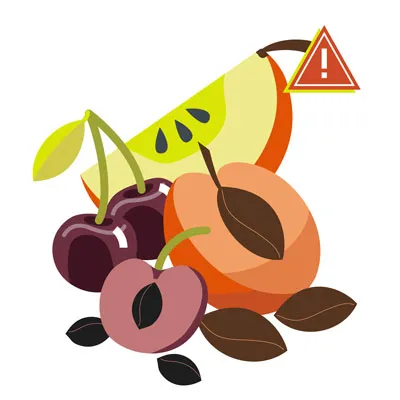 Illustration of apple seeds, apricot pits, cherry pits, and plum pits
Illustration of apple seeds, apricot pits, cherry pits, and plum pits
3. Avocado
Avocados contain a substance called persin, which can cause vomiting and diarrhea in dogs. While the risk of severe toxicity is debated, the pit of an avocado is a significant choking and obstruction hazard for a dog’s gastrointestinal tract. It’s best to err on the side of caution and avoid avocados altogether.
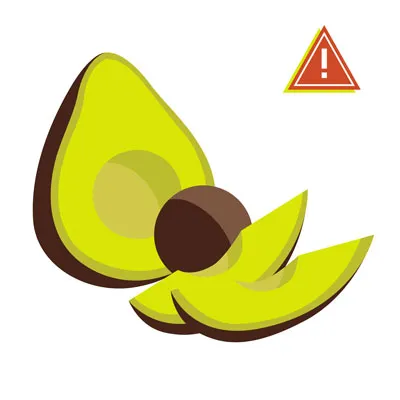 Illustration of an avocado
Illustration of an avocado
4. Broccoli
In large quantities, broccoli can be harmful to dogs due to the presence of isothiocyanates. While small amounts occasionally might be tolerated, the stalks can also pose an obstruction risk in a dog’s throat. Given the availability of safer vegetable options, it’s generally advisable to avoid feeding broccoli to your dog.
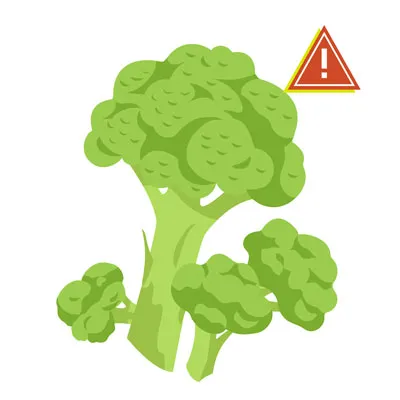 Illustration of broccoli
Illustration of broccoli
5. Caffeine and Coffee Grounds
Caffeine, found in coffee, tea, and some sodas, contains methylxanthines. These stimulants can cause serious health problems in dogs, including hyperactive behavior, vomiting, diarrhea, tremors, rapid heart rate, and even seizures. Coffee grounds and tea bags pose similar risks.
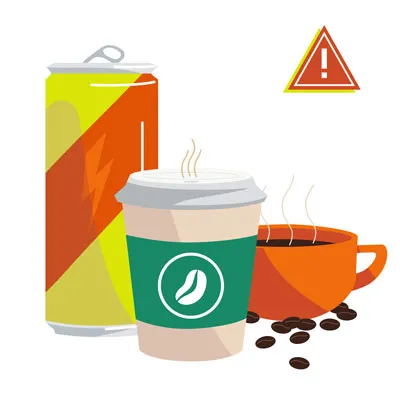 Illustration of caffeine and coffee grounds
Illustration of caffeine and coffee grounds
6. Chicken and Turkey Skin, Ham, and Other Fatty Cuts of Meat
High-fat foods like chicken or turkey skin, and fatty cuts of meat such as ham, can lead to severe gastrointestinal upset, including pancreatitis, a life-threatening condition. Additionally, cooked bones from poultry can splinter and cause internal injuries or obstructions. Always remember what foods can dogs have and not have regarding bones.
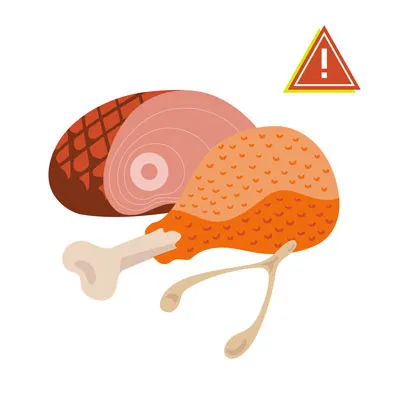 Illustration of chicken skin, ham, and fatty meat
Illustration of chicken skin, ham, and fatty meat
7. Chocolate
Chocolate is notoriously toxic to dogs due to theobromine and caffeine. The darker the chocolate, the higher the concentration of these dangerous compounds. Even small amounts can cause vomiting, diarrhea, elevated heart rate, tremors, seizures, and death. If your dog ingests chocolate, contact your veterinarian immediately. This is a critical item on the list of what foods dogs can t have.
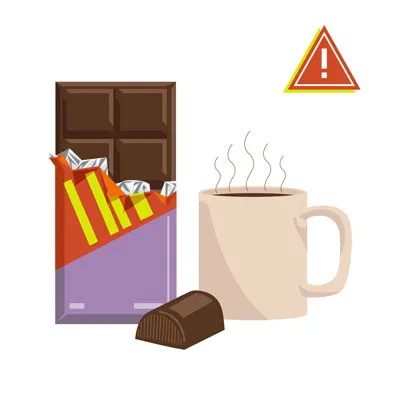 Illustration of chocolate bars
Illustration of chocolate bars
8. Grapes and Raisins
Grapes and raisins are highly toxic to dogs and can cause acute kidney failure, even in small quantities. Symptoms include vomiting, diarrhea, lethargy, and a decrease in urine output. If your dog consumes grapes or raisins, seek veterinary attention immediately.
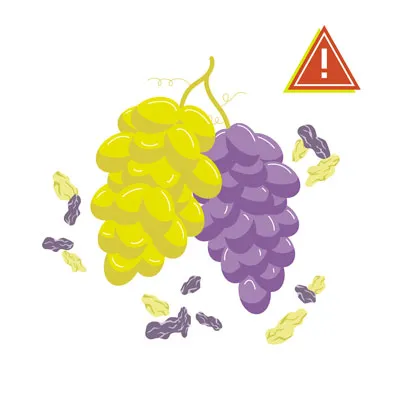 Illustration of grapes and raisins
Illustration of grapes and raisins
9. Macadamia Nuts, Almonds, and Pistachios
Macadamia nuts are particularly dangerous, causing weakness, vomiting, and tremors. While the exact toxic component is unknown, even a small amount can be problematic. Other nuts like almonds and pistachios can also be choking hazards or cause digestive upset due to their high fat content or seasonings.
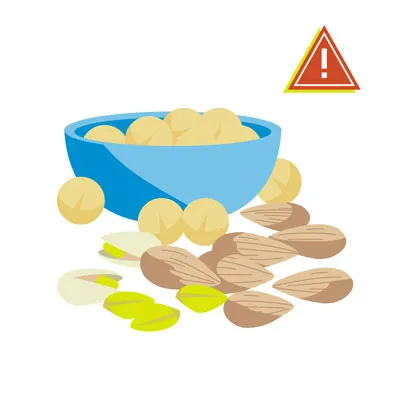 Illustration of macadamia nuts, almonds, and pistachios
Illustration of macadamia nuts, almonds, and pistachios
10. Milk and Dairy Products
Many dogs are lactose intolerant, meaning they lack the enzyme to properly digest lactose. This can lead to gas, bloating, and diarrhea. While small amounts of low-fat cheese might be tolerated by some dogs, it’s generally best to avoid giving them milk or other dairy products.
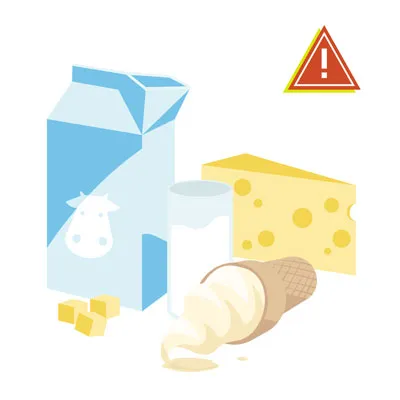 Illustration of milk and dairy products
Illustration of milk and dairy products
11. Mushrooms
Wild mushrooms can be highly toxic and cause a range of symptoms from digestive upset to organ failure and neurological issues. While commercially grown mushrooms might be less dangerous, it’s safest to avoid feeding any type of mushroom to your dog.
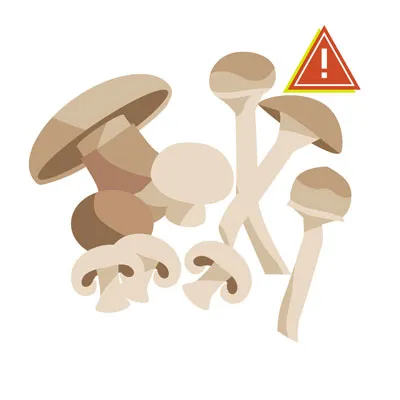 Illustration of mushrooms
Illustration of mushrooms
12. Nutmeg and Cinnamon
Nutmeg contains myristicin, which can cause hallucinations, vomiting, and abdominal pain in dogs, especially in larger doses. Cinnamon, while not toxic, can irritate a dog’s mouth and digestive tract and potentially lead to low blood sugar.
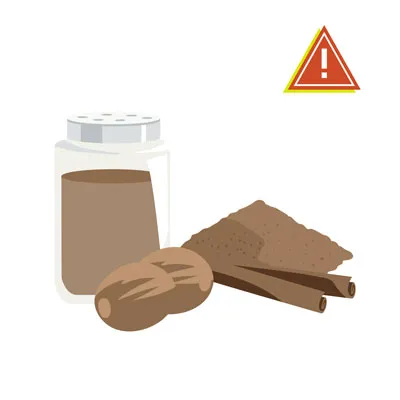 Illustration of nutmeg and cinnamon
Illustration of nutmeg and cinnamon
13. Onions, Garlic, Chives, and Leeks
These allium family members contain compounds that can damage a dog’s red blood cells, leading to anemia. This toxicity can occur from both fresh and powdered forms. Even small amounts ingested regularly can be harmful, and certain breeds, like Akitas and Shiba Inus, are particularly sensitive.
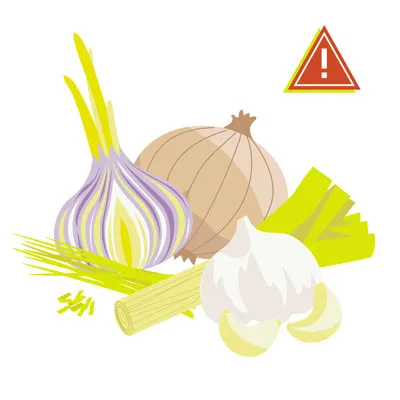 Illustration of onions, garlic, chives, and leeks
Illustration of onions, garlic, chives, and leeks
14. Salt
Excessive salt intake can disrupt a dog’s electrolyte balance, leading to symptoms like excessive thirst, vomiting, diarrhea, tremors, seizures, and even coma. Avoid giving your dog salty snacks like potato chips or pretzels.
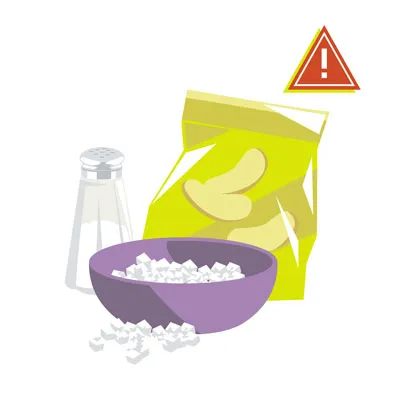 Illustration of salt
Illustration of salt
15. Spicy Food
Spicy foods can cause significant gastrointestinal distress in dogs, including vomiting, diarrhea, and stomach ulcers. Their digestive systems are not equipped to handle the capsaicin found in hot peppers, leading to pain and discomfort.
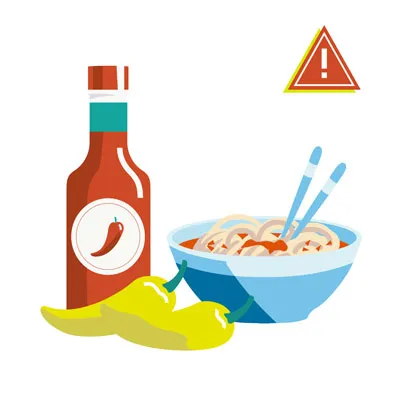 Illustration of spicy food
Illustration of spicy food
16. Sugar-Free Gum and Candy (Xylitol)
Xylitol is an artificial sweetener commonly found in sugar-free gum, candy, baked goods, and even some peanut butters. It is extremely toxic to dogs, causing a rapid drop in blood sugar (hypoglycemia) and potentially leading to liver failure, seizures, and death. Even a small amount can be fatal.
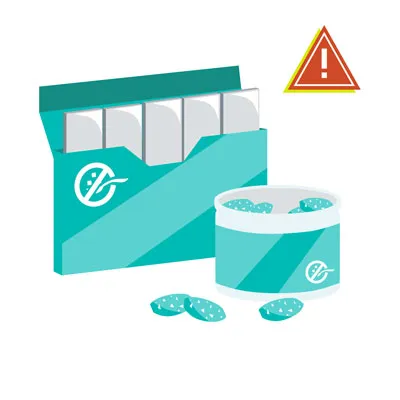 Illustration of sugar-free gum and candy
Illustration of sugar-free gum and candy
17. Tomatoes and Raw Potatoes
While ripe tomatoes are generally safe in moderation, the green parts of the tomato plant, including unripe tomatoes, contain solanine, which is toxic. Raw potatoes also contain solanine and can cause digestive upset. Cooked potatoes without seasoning are generally safe.
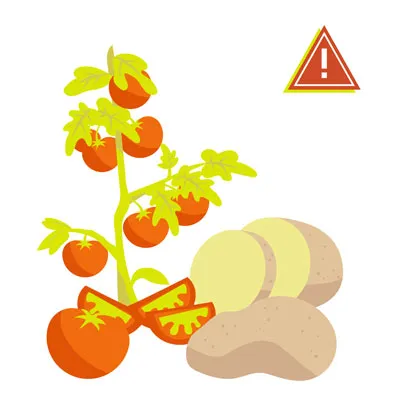 Illustration of tomatoes and raw potatoes
Illustration of tomatoes and raw potatoes
18. Tobacco
Nicotine in tobacco products is highly toxic to dogs. Ingestion can cause vomiting, diarrhea, tremors, seizures, heart problems, and even death. This includes cigarettes, cigars, and chewing tobacco.
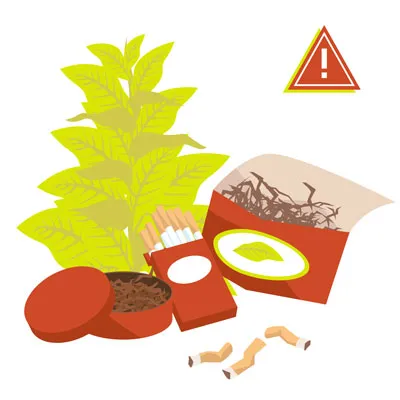 Illustration of tobacco products
Illustration of tobacco products
19. Yeast and Raw Dough
Raw yeast dough can expand in a dog’s stomach, causing severe pain, bloating, and potentially life-threatening gastric torsion or rupture. Furthermore, the fermentation process produces alcohol, leading to alcohol poisoning.
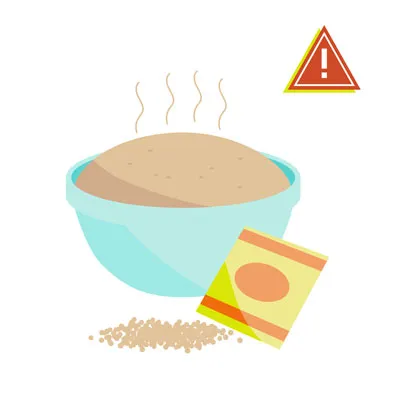 Illustration of raw dough
Illustration of raw dough
20. Raw Meat
Feeding raw or undercooked meat to dogs poses a risk of bacterial contamination with E. coli and Salmonella, which can cause severe gastrointestinal illness in both dogs and humans. Bones in raw meat can also be a choking hazard or cause internal injuries.
21. Rhubarb
The leaves and stems of the rhubarb plant contain high levels of soluble oxalates, which can bind with calcium in the body, leading to a dangerous drop in calcium levels. This can result in kidney damage, tremors, vomiting, and even renal failure.
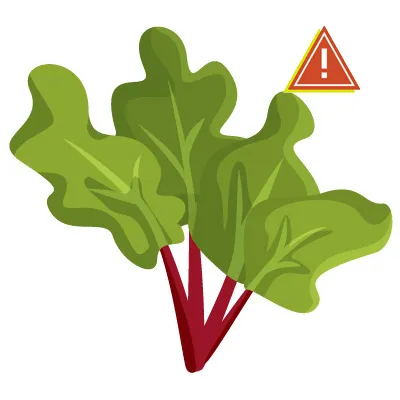 Illustration of rhubarb
Illustration of rhubarb
22. Star Fruit
Similar to rhubarb, star fruit also contains soluble calcium oxalate crystals, making it a dangerous food for dogs that can lead to kidney issues.
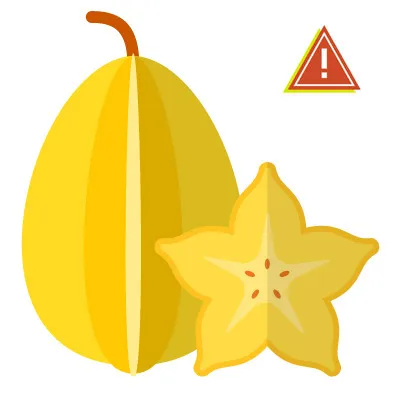 Illustration of star fruit
Illustration of star fruit
23. Flavored Water and Seltzer Water
While plain water is essential, flavored or carbonated waters often contain artificial sweeteners, sugar, or salt that can be harmful to dogs. Stick to fresh, clean water to ensure your dog’s hydration needs are met safely.
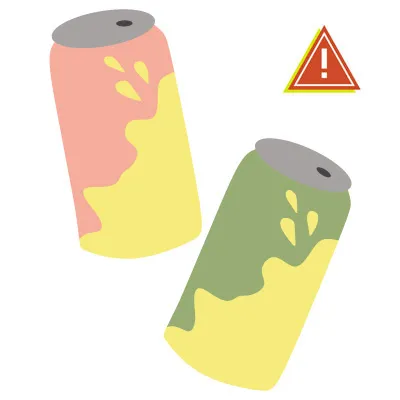 Illustration of seltzer water
Illustration of seltzer water
Foods That Are Safe for Dogs: A Positive Outlook
While the list of toxic foods is extensive, the good news is that many human foods can be safely enjoyed by dogs in moderation. Understanding what foods dogs can have and not have allows you to introduce a variety of healthy treats into their diet. Some excellent options include:
- Fruits: Apples (without core/seeds), bananas, blueberries, blackberries, cantaloupe, mangoes, peaches, pears, pineapples, and watermelon (seeds and rind removed).
- Vegetables: Carrots, cucumber, celery, green beans, and sweet potatoes (cooked).
- Proteins: Cooked eggs, plain cooked chicken or turkey (without skin, bones, or seasoning), plain cooked fish (like salmon or sardines, boneless), and small amounts of lean beef.
- Grains: Plain cooked rice, oatmeal, and quinoa.
- Other: Small amounts of plain, unsalted peanut butter (ensure it does not contain xylitol), and air-popped popcorn (plain, unsalted, unbuttered).
When introducing new foods, always do so in small quantities to monitor for any adverse reactions. It’s also wise to consult with your veterinarian about your dog’s specific dietary needs and safe treat options.
Who is Most at Risk? Identifying Vulnerable Dogs
While all dogs can be affected by toxic foods, certain groups are at a higher risk:
- Small Breeds: Due to their lower body weight, even small amounts of toxic substances can have a more severe impact.
- Puppies: Their developing digestive and immune systems are more susceptible to toxins and pathogens.
- Elderly Dogs: Older dogs may have underlying health conditions that make them more vulnerable to the effects of toxic foods.
- Dogs with Pre-existing Health Conditions: Dogs with chronic illnesses like diabetes, kidney disease, or heart conditions are at a significantly higher risk.
Prevention is Key: Safeguarding Your Dog from Toxic Foods
The best approach to preventing food-related poisoning is through diligent prevention. Here are essential strategies:
- Secure Storage: Keep all potentially toxic foods stored in high cabinets or sealed containers, well out of your dog’s reach.
- No Table Scraps: Never feed your dog directly from your plate or while you are cooking. This encourages begging and makes it harder to control what they consume.
- Educate Your Household: Ensure all family members, especially children, and any guests understand the importance of not feeding your dog human food.
- Holiday Vigilance: Be extra cautious during holidays when food is abundant and supervision might lapse. Keep food buffets out of reach and secure trash cans.
What to Do in Case of Accidental Ingestion
Despite the best precautions, accidents can happen. If you suspect your dog has ingested something toxic, immediate action is crucial:
- Contact Your Veterinarian or Pet Poison Control Immediately: Time is of the essence. Providing prompt veterinary care significantly increases the chances of a positive outcome.
- Provide Detailed Information: Be ready to tell the vet or poison control specialist the type of food ingested, the estimated amount consumed, and the time of ingestion.
- Avoid Home Remedies: Do not attempt to induce vomiting or administer any home treatments unless specifically instructed by a veterinarian. Some remedies can be more harmful than helpful.
For any concerns about what your dog might have eaten, or for advice on specific foods, consult your veterinarian. They are your most reliable resource for ensuring your canine companion’s health and safety.
